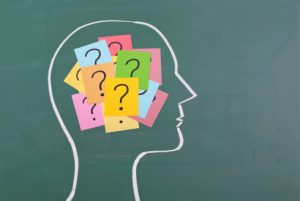 Psychogenic amnesia (also known as functional or dissociative amnesia) is an abnormality of memory function that is not attributed to structural brain damage or of a known neurobiological origin. The common presenting symptom is retrograde amnesia, whereby the individual is unable to recall any event leading up to the onset of amnesia itself. This includes all previously stored memories, especially ones that are stressful or traumatic in nature. They are able to form new memories moving forward. There are two types of psychogenic amnesia:
Psychogenic amnesia (also known as functional or dissociative amnesia) is an abnormality of memory function that is not attributed to structural brain damage or of a known neurobiological origin. The common presenting symptom is retrograde amnesia, whereby the individual is unable to recall any event leading up to the onset of amnesia itself. This includes all previously stored memories, especially ones that are stressful or traumatic in nature. They are able to form new memories moving forward. There are two types of psychogenic amnesia:
Global amnesia: Also called fugue state, whereby a sudden loss of personal identity occurs that may last from a few hours to an entire day.
Advertisement
Situation-specific: Can occur as the result of a particularly stressfully or traumatic event.
Psychogenic amnesia signs and symptoms
There are three types or patterns of psychogenic amnesia:
Localized: This is when specific areas of knowledge or areas of personal identity, such as childhood, are forgotten. It’s often the result of a traumatic memory or specific trauma—for example, a robbery victim who does not remember being robbed at gunpoint but can recall the detail from the rest of that day.
Generalized: Affects a broader area of a person’s memory, often encompassing major parts of their life. People with this particular symptom may not remember their name, job, or family members.
Fugue: A state of generalized amnesia where sufferers are unable to remember anything from their past. This often leads them to adopt a new identity, as they cannot remember a single detail from their own lives. For example: a man was passed up for promotion and he did not come home from work that night. His family reported him missing to the police, who found him days later. He was found 500 miles away, living under a different name, and he could not recognize his wife and kids. The man was also unable to say who he was or explain his lack of identification.
What causes psychogenic (dissociative) amnesia?
While psychogenic amnesia has a relatively unknown cause, we do recognize the reasons for its occurrence. It is commonly linked to a particularly stressful or traumatic event that the person has experienced or witnessed. This may include war, abuse, accidents, or natural disasters. There is a possibility of genetics playing a role in the development of psychogenic amnesia, as links to particular cases have had them occur in close relatives.
Psychogenic amnesia diagnosis
If a diagnosis of psychogenic amnesia is suspected, the doctor will first try to rule out any primary causes for the condition. This will take the form of a medical history and a physical exam. There are no lab tests to specifically diagnose psychogenic amnesia, but the use of imaging tests—such as CT or MRI—and blood tests may help shed some light if another diagnosis is suspected.
Certain conditions such as head injuries, brain diseases, drug and alcohol intoxication, or even sleep deprivation may all be alternative diagnoses. If none of these are found to be the cause, referral to a psychiatrist or psychologist who specializes in mental illness may be appropriate.
Psychogenic amnesia treatment
Treatment for such a condition can be difficult and complex, as it does not have an identifiable organic cause. But it may be useful to provide support and try to “reconnect” with the person who has lost their memories. It may be necessary to help them develop new coping skills and life skills to become a functional member of society again. Improving relationships with family and loved ones now forgotten can help the amnesiac safely deal with and manage the likely traumatic causative event.
The use of various treatment options will depend on the particular case and person—the type of amnesia and its severity will grant unpredictable results. The following are some treatment options employed in amnesia patients:
Psychotherapy: This is the main treatment for dissociative disorders and generally consists of many sessions of speaking to a psychotherapist to get to the root of the problem.
Cognitive-behavioral therapy: A form of psychotherapy focusing on changing harmful thinking patterns, feeling, and behaviors.
Eye movement desensitization and reprocessing: A technique that is designed to treat people who have continuing nightmares, flashbacks, and other symptoms of post-traumatic stress disorder (PTSD).
Dialectic-behavior therapy: A form of psychotherapy for those with severe personality disturbances.
Family therapy: Having this kind of support helps teach the family about the disorder and can help the person affected potentially regain their memories.
Creative therapies: This includes art and music, and it allows the patient to explore and express their thoughts and feelings in a creative environment, possibly revealing something not able to be expressed in words.
Meditation and relaxation techniques: May help calm the internal state of the patient, making them more receptive to treatment.
Clinical hypnosis: This is done through the use of intense relaxation, concentration, and focused attention in an attempt to achieve a different state of consciousness. It may allow the patient to explore thoughts, feelings, and memories that are hidden from the consciousness mind.
Advertisement
Medication: While no particular medication exists for psychogenic amnesia, coinciding symptoms may require prescription medication, such as depression or anxiety.
Fortunately, those with psychogenic amnesia usually respond well to treatment and often see a full recovery. This is often dependant on the level of support they receive and whether they are able to resolve their feelings about the particular traumatic event.
Related: Short-term memory loss: Causes and treatments
